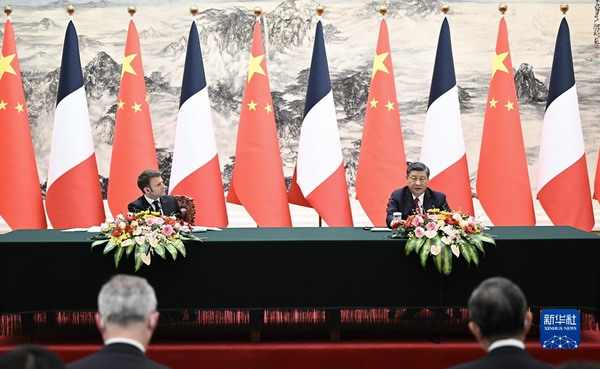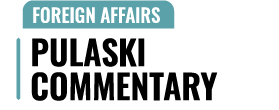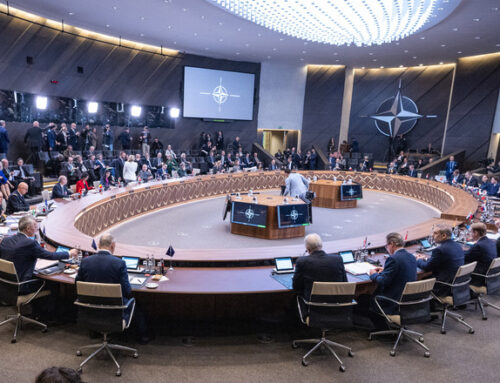£¨XHDW£©£¨4£©Ï°½üƽͬ·¨¹ú×ÜͳÂí¿ËÁú¾ÙÐлá̸
Autor foto: Domena publiczna



£¨XHDW£©£¨4£©Ï°½üƽͬ·¨¹ú×ÜͳÂí¿ËÁú¾ÙÐлá̸
Autor foto: Domena publiczna
Emmanuel Macron’s visit to China: illusory results?
Autor: Manon Boscher
Opublikowano: 14 kwietnia, 2023
The French president, Emmanuel Macron, visited China for a three-day state visit from 5 to 7 April 2023. Emmanuel Macron was accompanied by the President of the European Commission, Ursula von der Leyen, to show China European unity. The aim of this visit was to „reconnect”[i] France and China, in the words of Emmanuel Macron, after three years of strained relations. This visit was also under the sign of the development of economic partnerships between France and China, since the French president came accompanied by about fifty business leaders. It was also an opportunity to discuss the war in Ukraine and China’s position. This state visit did not, however, lead to any concrete results regarding the Chinese position on the resolution of the war in Ukraine. This also highlighted the French desire to take a singular path, detached from the United States, and distinct from the European Union, which is not favorable in a tense international context calling rather for the unity of the West.
A dialogue without major advances
Was Emmanuel Macron right to go to China? At first glance, one could answer in the affirmative. Indeed, China remains the second world power, and it is therefore necessary to maintain dialogue with this country. Moreover, France and the European Union have important economic partnerships with China. France is even somewhat economically dependent on China, since France’s trade deficit with China reached 39.6 billion euros at the end of 2022.[i] In a tense economic context, and with high inflation in France, it seemed necessary for the French president to boost the French economy by signing contracts with China. Several agreements were signed as a result of this approach, including important deals with Airbus. However, it must be stressed that on the subject of the war in Ukraine, Emmanuel Macron obtained almost nothing from his Chinese counterpart, Xi Jinping. The Chinese president only announced „a resumption of peace talks as soon as possible”, while the French president had said „I know I can count on you to bring Russia to its senses and everyone to the negotiating table”.[ii] Emmanuel Macron also emphasized the „major role” of China in „finding a path to peace in Ukraine”.[iii] However, it seems illusory to think that China will take a position on the war in Ukraine, as it is not in its interest. China continues its game of deception, saying that it is ready to call Volodymyr Zelensky „when the time comes”[iv], but this is just talk. This is in line with its twelve-point peace plan presented on February 24. China’s objective is to present itself as a mediator, while no concrete action has been taken so far. In fact, the last few months have seen a rapprochement between China and Russia. It is therefore not in China’s plans to help Ukraine, since a victory for Ukraine would mean a victory for the Western democracies and the current world order against which China is fighting. That said, Emmanuel Macron’s visit has made it possible to confront China with its contradictions. Firstly, the French President reaffirmed the need for China not to deliver arms to Russia if it wishes to position itself as a mediator in this war. Secondly, the Chinese President reaffirmed his nuclear doctrine that „nuclear weapons cannot be used”[v], and therefore questions its non-condemnation of Russia following the delivery of nuclear weapons on Belarusian soil.
The French third way
During this state visit, Emmanuel Macron adopted a non-aligned stance towards the United States, and was timorous in relation to the position taken by the President of the European Commission. Emmanuel Macron, following the Gaullist tradition of detachment from the United States, wanted to defend France’s own interests. He stated, „we do not want to dissociate ourselves from China on the economic level and from a strategic point of view we do not want to enter into a logic of confrontation against it as the United States would like”.[vi] By detaching himself from the United States, Emmanuel Macron seems to be presenting a third way, neither too aligned with the United States, nor too close to China, but this seems muddled. It gives the impression that France is „equidistant”[vii] from the United States and China, even though France is part of the West. Added to this is the fact that the French president did not address the issues of tension with Beijing during his visit. While Ursula von der Leyen had not hesitated to state, on 30 March, that „the way China will continue to react to Putin’s war will be a determining factor in the future of relations between the EU and China”.[viii] Emmanuel Macron, instead of joining the European Union’s position, and thus showing European unity, preferred to show complacency with China. Moreover, in recent years, the Chinese regime of Xi Jinping has become even more authoritarian than it already was, with the internment of the Uighurs, the repression of demonstrations in Hong Kong, and now the growing tensions with Taiwan. This is evidenced by the military encirclement exercises around Taiwan and the simulated bombings that took place from 8 April, following the visit of Taiwanese President Tsai Ing-wen to California. She met with Kevin McCarthy, the Speaker of the United States House of Representatives, reiterating United States support for the sovereignty of the island of Taiwan, which deeply irritates China. France, presenting itself as an Indo-Pacific power[ix], should have denounced these military exercises. Instead, in an interview with the French newspaper Les Echos and the American website Politico on his return from his state visit, Emmanuel Macron adopted a detached position on the Taiwanese issue. He explained that „the worst thing would be to think that we Europeans should be followers” and „adapt to the American rhythm and a Chinese reaction”. He strongly contests this „block to block” logic, and pleads for the establishment of a European strategic autonomy.[x] This interview was badly received by the United States and its European allies. Although strategic autonomy seems necessary, this position is anachronistic. Indeed, this is a time for unity in the Western bloc in the face of the war in Ukraine and Chinese interference, not division.
The need for a united West
Emmanuel Macron’s decision to invite the President of the European Commission on this state visit was a right decision, as it showed both the unity of the European Union and its power. The European market represents 450 million people, compared to 68 million for France.[xi] This is not insignificant for China, whose economy is very dependent on the European market. The European Union, composed of 27 member states, is powerful when it speaks with one voice, and could use this to sway Chinese positions. This could encourage Xi Jinping to distance himself from Vladimir Putin, seeing that this is not good for his business. However, the European Union is still very dependent on China in its trade, and mechanisms need to be put in place to guard against this asymmetry. A strategy of decoupling, that the United States would like, is therefore not possible for the moment, but it is necessary to control Chinese investment in the European Union which threatens its security.[xii] In this sense, the desire for European strategic autonomy is a good idea, since it would reduce the European Union’s dependence on external countries, such as China and the United States, from an economic, security and military point of view, but it is a very long strategy to put in place. Thus, in the current context of war in Ukraine, it is still the Americans and NATO which are heavily involved in the war effort in Ukraine and in maintaining security in Europe. It is therefore necessary for the West to remain united. The support to Ukraine, represents on the one hand the support to the integrity and the territorial sovereignty of Ukraine, and on the other hand, the defence of the Western values of our democracies. Moreover, since the beginning of the war, China has been watching with attention everything that happens in Ukraine, and a Western victory could incite it not to invade Taiwan, fearing reprisals and the power of the Western bloc. The war in Ukraine and the tensions in Taiwan are therefore linked, and require a common and firm stance towards Russia and China. Emmanuel Macron’s visit, although it allowed for the development of partnerships with China, did not have the expected effects. The French president thought he was encouraging the Chinese president to put an end to the war in Ukraine, and therefore avoided raising the issues of tension. This was probably not the right tactic to adopt, as it was necessary to relaunch a dialogue in a firm and lucid manner on Chinese intentions. France and the European Union must be united on the issue of the war in Ukraine and coordinate with the United States, particularly with regard to support for Taiwan. The credibility of the Western world is at stake.
Manon Boscher, External Contributor
[i] Tresory Department, „Bilateral exchanges between France and China„,Ministry of Economics and Finance, Mars 22, 2023 https://www.tresor.economie.gouv.fr/Pays/CN/echanges-bilateraux-entre-la-france-et-la-chine
[ii] Marc Julienne,”Macron tells Xi to „count” on him to „bring Russia to its senses„, IFRI, April 6, 2023 https://www.ifri.org/fr/espace-media/lifri-medias/macron-dit-xi-compter-lui-ramener-russie-raison
[iii] Marc Julienne,”Macron tells Xi to „count” on him to „bring Russia to its senses„, IFRI, April 6, 2023 https://www.ifri.org/fr/espace-media/lifri-medias/macron-dit-xi-compter-lui-ramener-russie-raison
[iv] Arthur de Laborde, „Emmanuel Macron in China: why the assessment of the head of state’s visit is mixed », Europe1, April 7, 2023 https://www.europe1.fr/politique/emmanuel-macron-en-chine-pourquoi-le-bilan-de-la-visite-du-chef-de-letat-est-mitige-4176776
[v] Marc Julienne,”In China, Emmanuel Macron urges Xi Jinping to mediate on Ukraine… in vain », IFRI, April 6, 2023, https://www.ifri.org/fr/espace-media/lifri-medias/chine-emmanuel-macron-incite-xi-jinping-mediation-lukraine-vain
[vi] Emmanuel Lincot, „Emmanuel Macron’s visit to China: towards a renewal of Franco-Chinese relations?„, IRIS, April 7, 2023 https://www.iris-france.org/175018-visite-demmanuel-macron-en-chine-vers-un-renouement-des-relations-franco-chinoises/
[vii] Le MONDE, „Taiwan, a question for Europe”, April 11, 2023 https://www.lemonde.fr/idees/article/2023/04/11/taiwan-une-question-pour-l-europe_6169057_3232.html
[viii] Marc Julienne,”Macron tells Xi to „count” on him to „bring Russia to its senses„, IFRI, April 6, 2023 https://www.ifri.org/fr/espace-media/lifri-medias/macron-dit-xi-compter-lui-ramener-russie-raison
[ix] Le MONDE, „Taiwan, a question for Europe”, April 11, 2023 https://www.lemonde.fr/idees/article/2023/04/11/taiwan-une-question-pour-l-europe_6169057_3232.html
[x] Le MONDE, „Taiwan: Emmanuel Macron calls on the European Union not to „follow” the United States or China », April 9, 2023 https://www.lemonde.fr/international/article/2023/04/09/taiwan-emmanuel-macron-appelle-l-union-europeenne-a-ne-pas-etre-suiviste-des-etats-unis-ou-de-la-chine_6168865_3210.html
[xi] Le MONDE,”Emmanuel Macron and Ursula von der Leyen in China: a difficult but useful dialogue », April 8, 2023 https://www.lemonde.fr/idees/article/2023/04/08/emmanuel-macron-et-ursula-von-der-leyen-en-chine-un-dialogue-difficile-mais-utile_6168780_3232.html
[xii] Interviews : Marc julienne, Pascal Boniface, Nathalie Loiseau, Isabelle Lasserre, Ursula Gauthier, David Baverez „Macron in China: partners or rivals » France TV, C ce soir, April 6, 2023
[i] Emmanuel Lincot, „Emmanuel Macron’s visit to China: towards a renewal of Franco-Chinese relations?„, IRIS, April 7, 2023 https://www.iris-france.org/175018-visite-demmanuel-macron-en-chine-vers-un-renouement-des-relations-franco-chinoises/





